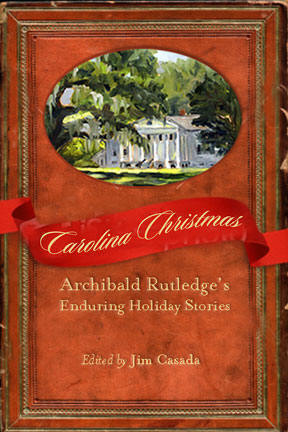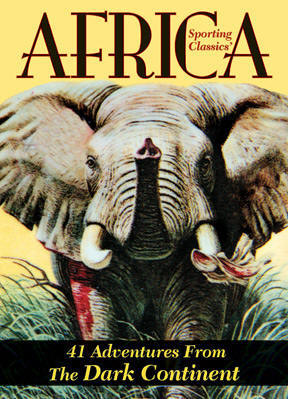December 2010 NewsletterJim Casada
Web site:
www.jimcasadaoutdoors.com A Sack Full of Christmas Gift SuggestionsAs any author who pays much attention to how his books sell realizes, the top time of the year for moving them comes during the Christmas season, with, at least when it comes to volumes related to hunting and fishing, Father’s Day coming in a rather distant second. Accordingly, this newsletter offers a goodly number of books, far more than usual, with the idea being to offer some variety for sportsmen of different tastes. Hopefully you will find something which helps fill your holiday gift needs, and of course I will be glad to sign, inscribe, and, if you desire, personalize any purchases.
One final thought – I’ll gladly inscribe and sign any and all orders, and they will be mailed either the day received or the following day (except Sundays). Postage is free on orders over $200 and it is a maximum of $10 for orders up to that level. There should be something to suit your tastes, and with that in mind, let’s turn to a poignant Christmas tale, my favorite, which should put every reader in a meditative and giving mood. My Favorite Christmas StoryAs those of you have read this newsletter for some time realize, I grew up in the Great Smokies, situated squarely in the readily identifiable if somewhat geographically ill-defined area known as Appalachia. In the 1950s, that translated to somewhat straitened economic circumstances, although in truth as a boy I never thought of my family as being poor. We always had plenty of food, thanks to growing a big garden, raising our own hogs, having a small orchard, and putting plenty of game and fish on the table. Furthermore, Dad worked hard, made a decent wage for the area in which we lived, and both he and Mom understood frugality in the way only those who had known truly hard times could. They had been young adults in the depths of the Depression and knew from first-hand experience the old mountain concept of “make do with what you’ve got.” That’s precisely what we did as a family – made do. Mom canned and dried food – lots of it. She was a wizard with needle, thread, and sewing machine; made countless quilts during her lifetime; and possessed a special kind of culinary magic which could turn commonplace and cheap ingredients into mighty fine fare. Dad was extremely handy and could fix most anything which needed fixing, had a real green thumb, got more life out of tools and small machines than you could imagine, and managed money with great care. Neither of them believed in buying much of anything on credit, and when they did finance something – the only things I ever knew of them acquiring without paying in full on the spot were the house I grew up In, automobiles, and college educations for my siblings and me – it was only after careful consideration and with dogged determination to pay it off as soon as possible. Thanks to their efforts, and a staunch work ethic they passed on to their children, it never really dawned on me that we weren’t at least comfortably middle class until I went to college. After all, most everyone I knew as a youngster lived in circumstances similar to those of our family, But when I got to college there were some students for whom money clearly wasn’t an issue. For my part, I had a small scholarship, and a workship which saw me wash dishes for first year, labor with the ground crew my sophomore year, and stoke coal-fired furnaces the final two years of my undergraduate career. Even a good while later, after marriage and commencing graduate studies, the simple fact of my financial situation, along with being a son of the Appalachian soil, got me a research fellowship. Of course a pretty solid level of performance during my doctoral studies at Vanderbilt helped, but you had to be from Appalachia to qualify for this particular fellowship. All that being duly recognized, years of youth and young manhood spent living a lean existence were nothing compared to what my Dad knew as a boy. His boyhood, spent living in a little high mountain flat where a family of nine children and their parents eked out a hardscrabble living farming, cutting acid wood (mainly chestnuts in the days before the blight killed this monarch of eastern forests), and gathering chestnuts to sell in the fall, defined poverty. The family was almost totally self-sufficient in that they raised, grew, shot, or foraged for virtually everything they needed, but there was precious little “cash money” for the few items which had to be bought. Incidentally, my Grandpa Joe never described ready funds in any way other than “cash money.” There was so little of it in his life I guess he felt the redundancy was richly deserved. That situation, adequate food and shelter but just enough cash for essentials such as shoes, was what faced my father and his family as Christmas, 1916 drew near. The bittersweet story which would unfold in that bleak December, with Europe at war, the United States being inexorably drawn towards that conflict, and times particularly hard in the mountains, is my favorite tale of Christmas. Dad had never received a store-bought Christmas present, although he and his siblings did get a Christmas stocking each Yuletide. The stocking would contain a single orange, a few pieces of hard candy, some nuts, and apple, and maybe some small item of clothing, such as a pair of mittens or socks. Otherwise, Christmas presents were limited to simple home-made, hand-carved toys such as a slingshot or popgun. On this particular Christmas though, Dad was desperately hoping for something more – a pocket knife. Other boys living in the area who went to school with him owned a knife, and he had often heard his father, my Grandpa Joe, speak of a knife as being “the ultimate tool.” Every high country boy and man carried a pocket knife as a matter of habit, and they were kept finely honed for uses varying from simple whittling to countless practical applications around the farm. My father felt sorely deprived by not having a knife, and even his father admitted he was old enough to own one. Accordingly, when Christmas morning arrived, Dad rushed to his stocking with a sense of anticipation unlike any he had ever known. Toward the bottom of the stocking there was a suggestive bulge which seemed to be the right shape, and Dad eagerly dug through the fruits and nuts to get to it. Sure enough, it was a knife, but as he grasped the item he had so coveted tears streamed down his face and he rushed from the room. Dad was crushed and forlorn as only a young lad facing the greatest disappointment of his life could be. He had ample reason for dismay, for the “knife” was a piece of hard candy shaped and colored to look like the real thing. The simple truth of the matter was that Grandpa Joe and Grandma Minnie did not have the money, even though a fine pocket knife only cost a dollar in those days, to lavish on such a luxury. Grandpa tried to explain this to his oldest son, but the disconsolate boy couldn’t understand. This traumatic moment left a lasting impact, and therein lies to heartening part of the tale. Dad never forgot this Christmas Day of abject dismay, and he rectified the matter in the finest way he knew how. From the time I was five or six years old, no matter what else I received at Christmas (usually a box of shotgun shells, some hunting socks, a book or two, and fishing or hunting attire), there was always a knife in my stocking. Sometimes it was a folder to carry in my pocket; on other occasions a sheath knife. The same thing happened with my younger brother and, much later, with each of Dad’s three grandsons. He was determined that none of his male offspring would ever be without a knife. To this day, even though at 101 years of age his mind has faded to an appreciable degree, he is apt to ask most any time: “Have you got a knife in your pocket?” Likewise, after a five-day stay in the hospital a couple of months back, his single biggest concern was the whereabouts of his cherished Barlow. What Dad did, and it was an annual ritual for a good six decades, was do the best he possibly could to rectify a bitter moment from boyhood. He did this through creating countless bright moments for his male line with gifts which, for him, had a deep and abiding meaning. Small wonder I cherish pocket knives, own dozens of them, and seldom touch a whetstone or whittle a piece of wood without thinking about a sad day which my father ultimately transformed in a wonderful way.
Let my close by wishing each and every one of you all the best for this holiday season. May there be a pocket knife in your stocking or a good book under your tree. May you have treasured memories of Christmas past, whether bittersweet or beautiful, to call to mind at this most nostalgic of times. And may you keep firmly in mind the truer, deeper meaning of the season. Thanks to each and
every one of you who are among my readers for your purchases, your kind
comments, your questions, and for being what I consider friends. This
newsletter gives me joy by letting me once more be a boy, through
serving as a vessel of fond memory, and as an outlet for thoughts on
things I hold near and dear. It’s a privilege to have you as readers,
and if you happen to be in the area where I have book signings scheduled
in the coming weeks, by all means stop by to shake and howdy. HAPPY
HOLIDAYS!!! Thank you for subscribing to the
Jim Casada Outdoors
newsletter. |
||||||||||||||||||||||||||||||||||||||||||||||||||||||
|
Send mail to
webmaster@jimcasadaoutdoors.com with
questions or comments about this Web site. |

 Carolina
Christmas
Carolina
Christmas A
Brace of Books on African Hunting
A
Brace of Books on African Hunting